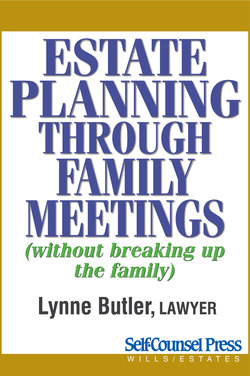Читать книгу Estate Planning Through Family Meetings - Lynne Butler - Страница 15
На сайте Литреса книга снята с продажи.
5. Being Too Busy
ОглавлениеThe term “sandwich generation” applies to many people reading this book. The sandwich generation refers to people, usually in their 40s or 50s, who have children at home to look after as well as aging parents to look after. They are “sandwiched” between the twin responsibilities of looking after children and looking after parents. They also have jobs and homes, marriages and social lives to look after. Part of being in that position is always being busy and having too many demands on their time.
A person in this situation will often say that he or she does not have time to review current documents, find a lawyer, have a meeting with the lawyer, look at draft documents, and then see the lawyer again to sign the will. He or she will say that there is no time to look for documents and gather statements. Sometimes people put off the planning until some undetermined future time when they believe they will be less busy, not realizing, or perhaps not caring, that with this approach, that future time will never arrive.
The trick to fitting extra activities into an already busy life is scheduling. We all manage to fit in the annual vacation, birthdays, time off for illness, dental appointments, etc., even though each of those things is not part of our regular day. If those things can be slotted in, so can estate planning. There is nothing wrong with making an appointment with a lawyer weeks in advance, as long as you have a reliable system of keeping track of appointments so that you do not forget about it.
Another idea for fitting estate planning into a busy schedule is to break down a large project into smaller, bite-size pieces to avoid the feeling of being overwhelmed. This is one of the reasons some people like to write lists before beginning a task; it helps them feel in control of the task. You just need to accomplish one small, first step in order to feel that you have made a start and that the project is not so intimidating.
Instead of thinking “I must get my estate planning done,” break it down. Start with one of the following suggestions (tailored to your situation, of course):
• “I’ll ask around at work to see if anyone can recommend a good wills lawyer.”
• “I’ll ask my friend, Rob, which lawyer did his will for him.”
• “I’ll get my old will out of the safe deposit box, dust it off, and read it to remind myself of what I did last time.”
• “I’ll collect all of my bank statements, investment statements, and the deed to my house so that I know which assets I’m dealing with.”
• “I’ll make a list of my spouse and children’s full names and birth dates to get ready for an appointment with the lawyer.”
• “I’ll read my shareholders’ agreement for my business to see what it says about my share of the business on my passing away.”
• “I’ll call the lawyer and make an appointment.”
It is probably a good idea to write down the steps you plan to take in a list so that you can check off each one as you do it.
If you are a busy person, understand that you might not get your estate planning done in as brief a time as someone else might. That is a fact of your life, and is perfectly acceptable as long as the process is begun and eventually finished. Allow yourself reasonable time so that you do not feel pressured.
